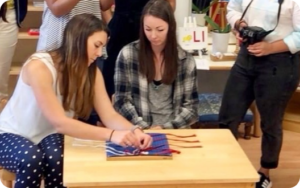“How to become a Montessori teacher” is more than a query; it’s the beginning of a journey into a most transformative educational experience.
As Montessori education continues to flourish globally, the demand for certified Montessori educators has increased, reflecting a collective recognition of the value this educational approach brings to child development. This method, grounded in freedom, respect, independence, and a hands-on learning environment, fosters academic skills and nurtures emotional and social intelligence.
The Montessori philosophy emphasizes creating a prepared environment where children can be free to learn at their own pace. This approach has proven effective across cultures and communities, making the role of a Montessori teacher both highly sought after and deeply impactful. As we are part of this transformative educational movement, we delve into the unique blend of philosophy, curriculum, child development, research, and art that makes Montessori education a beacon of opportunity for educators worldwide.

Who Can Become a Montessori Teacher?
Becoming a Montessori teacher is a journey open to individuals from all backgrounds. Montessori educators hail from diverse professional experiences, academic disciplines, and cultural contexts, enriching the educational landscape with their unique perspectives and expertise. While the specific details may vary depending on location, there are overarching requirements that guide the path to becoming a Montessori teacher.
Diverse Backgrounds of Montessori Teachers
Montessori educators bring a rich tapestry of backgrounds to their classrooms. Some may have previous experience in traditional education settings, while others transition from careers in various fields from psychology to finance or the sciences to business. This diversity of backgrounds fosters a dynamic learning environment and allows for a multidimensional approach to teaching and nurturing children.
Educational Prerequisites
Currently, the American Montessori Society accepts credential candidates with High School diplomas, Associate Degrees, Bachelor’s Degrees and above, and degrees earned internationally. There are three types of Montessori credentials: the Associate’s Credential available to anyone who has completed high school or some college, the Credential which requires a Bachelor’s degree in any subject area, and the International Credential which requires an equivalent Bachelor’s level degree earned at an international institution.
In the United States, the prerequisites for becoming a Montessori teacher can vary depending on the school. While a four-year college degree is often preferred to teach at many schools, it is commonly not a requirement. However, it’s essential to research and understand the educational requirements specific to the state, region, or country where one intends to teach.
Variability in Requirements Worldwide
Although the AMS Montessori teacher credential we offer is widely accepted globally, requirements for teachers can differ from country to country. While some countries may mandate specific educational backgrounds or certifications, others may offer more flexibility regarding prerequisites. Prospective Montessori teachers should familiarize themselves with the regulations and standards relevant to their desired teaching locations.
Opportunity for Individuals without a Formal Background in Education
One of the unique aspects of Montessori education is its openness to individuals without traditional educational backgrounds. Parents who have experienced the transformative impact of Montessori education firsthand may feel inspired to become educators themselves.
This unique opportunity allows for integrating diverse experiences and insights into the teaching practice, enriching the educational journey for teachers and students alike. In essence, the path to becoming a Montessori teacher welcomes individuals from various walks of life, embracing diversity and fostering a sense of inclusivity within the educational community. Whether individuals come from a background in education or discover their passion for Montessori later in life, they approach the journey toward becoming a Montessori educator with openness, adaptability, and a commitment to holistic child development.
Understanding Certification Requirements
Understanding the certification requirements is fundamental for anyone aspiring to become a Montessori educator. Here, we delve into the significance of thoroughly examining both local and national regulations for teaching credentials, as well as introduce the concept of Montessori teacher education programs and their global availability.
Introduction to Montessori Teacher Education Programs
Montessori teacher education programs are pivotal in preparing individuals for a career in Montessori education. These programs provide comprehensive training in the Montessori philosophy, principles, and practices, equipping aspiring educators with the knowledge and skills to effectively implement the Montessori curriculum in the classroom.
These programs may vary in duration, structure, and focus. Still, they all share a common goal: to prepare educators capable of nurturing children’s natural curiosity, independence, and love of learning through the Montessori approach. From traditional in-person courses to blended learning options and online platforms, aspiring Montessori educators have many choices when selecting a teacher education program that best suits their needs and preferences.
Embarking on Your Montessori Teacher Education
Engaging in a structured and comprehensive teacher education program tailored to the age group of children being taught is essential when embarking on the journey to become a Montessori educator. These programs offer various formats, durations, and prerequisites for enrollment, providing aspiring educators with the knowledge, skills, and credentials needed to implement the Montessori approach in the classroom effectively.
Structure of Montessori Teacher Education Programs
Montessori teacher education programs equip aspiring educators with in-depth training in the Montessori philosophy, methodology, and practical application of the Montessori curriculum in the classroom. These programs typically offer certification at different levels corresponding to the age groups of children being taught. The levels of certification include:
- Infant-Toddler (Birth to Age 3)
- Early Childhood (Ages 3-6)
- Lower Elementary (Ages 6-9)
- Upper Elementary (Ages 9-12)
- Secondary (Ages 12-15 and Ages 15-18)
The main credential is the Early Childhood credential. Many recommend starting with the Early Childhood level as it is critical to fully understand the philosophy. Many teachers then go on to add on their Elementary or Infant-Toddler training if they decide that age group fits them best. Each certification level focuses on specific developmental stages and educational practices tailored to meet the unique needs of children within those age groups.
Formats and Duration of Programs
Montessori teacher education programs are offered in various formats to accommodate aspiring educators’ diverse needs and preferences. It is important to note that there are not currently any Accredited fully online programs. Hybrid programs are gaining popularity, but it is important to complete at least part of the programs in person. These formats may include:
- Summer Intensives: Intensive training programs conducted over one or more summers, followed by additional courses and supervised practicum experiences.
- Year-Long Courses: Comprehensive programs spanning an entire academic year, providing in-depth instruction and practical training.
- Blended Learning: A combination of in-person and online coursework allows flexibility while maintaining hands-on learning experiences.
- Correspondence Courses: Distance learning programs that enable individuals to complete coursework remotely, often supplemented with practical components.
The duration of Montessori teacher education programs varies depending on the format and level of certification. Programs may range from an accelerated year to a few years to accommodate different schedules and timelines.
Prerequisites for Enrollment
While prerequisites for enrollment in Montessori teacher education programs may vary depending on the institution and certification level, certain requirements are commonly observed. These may include:
- Possession of a college degree in any field, although some programs may require a degree in a related discipline such as education or child development.
- Demonstrated commitment to the Montessori philosophy and principles, often evidenced through prior experience working with children or involvement in Montessori-related activities.
- Fulfillment of any additional requirements set forth by the accrediting body or institution offering the program.
Prospective Montessori educators are encouraged to carefully review the prerequisites for enrollment in their chosen program to ensure eligibility and readiness for participation.
Financial Considerations and Support
When considering a career in Montessori education, understanding the financial aspects of teacher education programs is crucial. By researching tuition costs and exploring sponsorship opportunities offered by Montessori schools, individuals can make informed decisions about their educational and career paths, ensuring they have the necessary support to succeed as Montessori educators.
Tuition Costs and Variability Among Programs
Tuition costs for Montessori teacher education programs can vary depending on program duration, format, location, and level of certification. Some programs offer part-time or online options at a lower cost, while others may require full-time attendance with higher tuition fees. Additionally, prestigious, or highly specialized programs may command higher tuition rates compared to more general or introductory courses.
Aspiring educators must research and compare tuition costs across different programs to find one that fits their budget and meets their educational goals. While tuition is an important consideration, it’s also crucial to weigh the quality and reputation of the program, as well as any financial aid or sponsorship opportunities available.
Sponsorship by Montessori Schools
Many Montessori schools recognize the value of investing in the professional development of their staff and may offer sponsorship or financial assistance to individuals pursuing Montessori teacher education. Sponsorship programs vary in scope and terms but often involve the school covering part or all of the tuition costs in exchange for a commitment to work at the school upon completion.
Sponsorship by Montessori schools provides several benefits for aspiring educators. Firstly, it reduces the financial burden of tuition costs, making teacher education more accessible to individuals from diverse socioeconomic backgrounds. Additionally, sponsored students often have the opportunity to gain practical experience through student teaching or internships at the sponsoring school, facilitating a seamless transition into their teaching roles post-graduation.
Furthermore, sponsorship programs foster a sense of loyalty and commitment between the educator and the school, as both parties have a vested interest in each other’s success. Educators who receive sponsorship often feel valued and supported by their school community, which can contribute to job satisfaction and retention in the long term.
Importance of Selecting a Credible Montessori Teacher Education Program
Selecting a credible Montessori teacher education program is paramount for aspiring educators seeking to uphold the integrity and effectiveness of Montessori education. A reputable program ensures that educators receive comprehensive training in the Montessori philosophy, methodology, and practical application of Montessori principles in the classroom. It equips educators with the knowledge, skills, and resources necessary to create nurturing learning environments that foster children’s holistic development. Most importantly a credible teacher training program can go a long way in assisting candidates with finding teaching jobs.
Role of Montessorita
Montessorita serves as a beacon of excellence in Montessori Teacher Education, offering fully accredited courses designed for children ages 2½ through 6. The academy’s program is meticulously structured to empower adults with the insights and skills necessary to effectively engage with children, address their individual needs, and facilitate continuous learning experiences grounded in the Montessori philosophy, theory, methodology, and practical implementation.
Through Montessorita’s Montessori Teacher Academy (MTA), adult learners embark on a transformative journey, acquiring theoretical knowledge and practical tools for navigating the complexities of child development and early childhood education. They learn to demonstrate proficiency in applying research findings and creating nurturing environments conducive to children’s growth and development.
Moreover, Montessorita’s program fosters a collaborative ethos, encouraging students to become valued members of school teams. They gain essential skills in communication and collaboration, enabling effective interaction with co-workers, administration, staff, parents, and the broader community, thereby promoting a holistic approach to education.
Becoming a Montessori teacher is not just a career choice; it’s a profoundly rewarding journey filled with opportunities for personal growth and making a lasting impact on children’s lives. By embracing the Montessori philosophy, educators unlock the potential to inspire curiosity, foster independence, and ignite a lifelong love of learning in young minds. Aspiring educators are encouraged to embark on this fulfilling career path, where every day presents a chance to shape the future and nurture the potential of each child they encounter.



